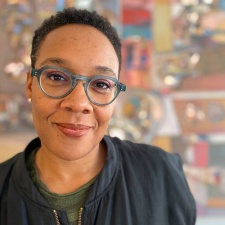We are in a pivotal moment. For decades, no matter the industry, people of colour have suffered through a lack of opportunity and a lack of respect, leaving them stuck playing second fiddle throughout their careers.
The games industry is no different, and here at PocketGamer.biz we wanted to do our part and help bring attention to the many incredible people of colour that help make up this sector. That is why we are committing to a new long-term regular feature to spotlight these people and their careers.
So, welcome to our new 'POC in Mobile' series, where discussion about finding a place in the games industry, the various challenges faced as a minority, and what truly needs to be done to make games more diverse will be the focal points of conversations.
This week we spoke to King producer on Candy Crush Soda Saga Desirée Brathwaite about the underlining bias of racism that she has encountered in the games industry and why people of colour on senior positions can help change this.
PocketGamer.biz: Can you start off by telling us about your role in mobile games and what it entails?
Desirée Brathwaite: I work as a game producer at King for the game Candy Crush Soda Saga. As a producer, I lead cross-functional teams in the development of in-game features and live events.
Curiosity is my driving force, and to me, reading fiction, comics and watching films are just as important sources of information as the constant flow of craft literature.Desirée Brathwaite
My role is to find and ensure a good balance between a variety of sometimes conflicting interests such as artistic vision, business and technical feasibility that meet player expectations, our business goals and of course sharp production timelines. In essence, I am a showrunner, helping the teams put on a great show for our players.
Why did you want to work in the mobile games industry?
Actually, I didn't choose the mobile games industry. When I joined King nine years ago, we were not on mobile. So, I had to learn the ropes of mobile at the same time the company did. It was an exciting time, a bit like rebuilding a ship in stormy waters, but I think we can say we did pretty well…
What I enjoy about mobile is the fast pace of development, which acts as a constraint, something that in my experience is conducive to innovation. I can assure you that not many “darlings” survive the ride, but the creative solutions our teams come up with under pressure are often golden.
Another thing I enjoy is the need to adapt the course and sometimes pivot in the constant flow of data feedback from our players. In that way producing for a live mobile game is more like white water rafting than ocean sailing.
How would you recommend people get started in games? Any tools or literature you would advise?
The best tools are your curiosity and your ability to observe. Curiosity is my driving force, and to me, reading fiction, comics and watching films are just as important sources of information as the constant flow of craft literature.
As for observation, I think it is good to train oneself to see the negative space. To stay ahead in games, it is more interesting to see what is missing from a game experience, rather than only focusing on what is there.
What did you study (if anything) for your role? Are there any courses out there that you would advise for aspiring professionals?
Believe it or not, I am a political economist. I trained for the US foreign service exam but once I moved to Paris for my studies, I started to doubt my commitment to a diplomatic career. I then shifted to market communications and advertising. In that line of work, I picked up the importance of having the end-user in focus. That is something I use today in my role as producer.
To make fun games, one must focus on the player. To be able to operate effectively as a producer, you have to take time to learn about the crafts represented in the cross-functional team. You don’t need to become an expert in everything but you should know enough to make relevant decisions. In addition, and to be an asset to your team, you have to combine technical and leadership skills.

As for technical skills, I would specifically highlight becoming very good at slicing and prioritising. I earned my colours doing just that as an agile coach a couple of years before becoming a producer, though there are other ways to develop that skill. Leadership skills are trickier, you can’t really pick those up from a book but you do need a good understanding of group and team dynamics. I did a fairly tough week-long practical course designed for Swedish military officers.
If you can’t take a course, I can recommend Team Dynamics by Susan Wheelan, The Five Dysfunctions of a Team by Patrick Lencioni, and Drive by Daniel H. Pink.
What do you think should be done to improve diversity, not only across the games industry, but across all industries?
Although one cannot expect that companies alone can tackle racial injustice in society at large, we can at least do our best to prevent it from playing out inside our organisations. The immediate reflex may be counting heads and asking HR to create policy documents.
But discrimination is a bit like corruption, we need to pay special attention to the situations where there are particular risks for it to take place. And it is not enough to focus on recruitment only. We have to ensure that performance evaluations and promotions are not tainted by bias. Furthermore, you need an inclusive, psychosocial environment for people to thrive and remain.
What are the biggest challenges you have encountered since joining the industry?
Number one would be the bias that black and brown people are less capable intellectually, and thus more suitable for roles that require less thinking. This bias plays out in ways that are normally subtle, but sometimes less so. A well-documented consequence of that bias is that the credit of strategic "thinking" work a black person does in collaboration with a white colleague, male or female – however minute that collaboration may be – will go to that white colleague by default.
To attract and retain talent of colour, you need to provide an inclusive environment where managers keep an eye on discrimination.Desirée Brathwaite
On top of that, as a woman with almost a decade working in tech, most of it with cutting edge product design and development in various areas, I still encounter the tiresome assumption that I somehow possess less of the technical and product knowledge of my male peers.
The last challenge that I also believe is a classic for women in tech, is seeing my leadership skills being reduced to caring skills such as “being good with people” and all that. However, I want to stress that none of these challenges are insurmountable. They are obstacles for sure, and it is frustrating that the playing field is far from level, but in the end, resistance sharpens the sword.
What do you think can be done to help encourage more people of colour to get into games?
Apart from doing the internal work necessary to ensure that their talent and contributions are fairly valued; being inclusive and conscious in the content we create has a greater impact on people from marginalised groups than one may think.
Diverse characters, stories and interactions, with Blizzard’s Overwatch as an example, have the power to communicate, inspire and reach people of colour by confirming that we exist.
Is there anything that recruiters should be doing differently to address the lack of diversity across not only games development but all industries?
This is not an easy question, which I think again is intimately linked to the internal work. To attract and retain talent of colour, you need to provide an inclusive environment where managers keep an eye on discrimination. Furthermore, nothing is more attractive than walking the talk. Having persons of colour in senior expert and management positions in your organisation does signal that the glass ceiling can be broken.
Since the recent surge in the #BlackLivesMatters campaign, what changes (if any) have you seen from across the industry to address the issue?
I am very proud and grateful of what Activision Blizzard is doing to remove racism in Call of Duty, Modern Warfare and Warzone. As for internal work, I can testify that King has acted impeccably to address this tough issue, having sincere company-wide discussions on the systemic violence and discrimination we as black and brown people face in our day to day lives outside the company walls.
I know it was an eye-opener for many. When it is your colleague telling you, what is happening to them, it hits close. I know our white co-workers listened to us and understood. It marked an important step for all of us.
What advice do you have for other people of colour that are looking at getting into games?
Find mentors of all colours in the field and go for it. It’s the place to be, and we need you here!





















